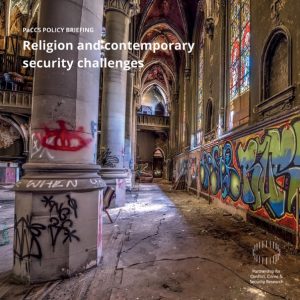PaCCS Policy Briefing on “Religion and Contemporary Security Challenges”
By Dr Tristram Riley-Smith
Last year, we invited policy-makers, academics and members of charitable and faith organisations to spend a day discussing insights from the work of four leading researchers (all PaCCS Leadership Fellows – see below) who have been studying perceptions about religion and security, faith and violent extremism.
Our aim was not just to impose these research findings on the audience, but to engage everybody in a dialogue where the insights from the four Professors were refracted and filtered by the experiences of those who wrestle with these issues on a daily basis. We wanted, ultimately, to draw out a small number of findings – matched with appropriate recommendations – that could be communicated clearly and simply.
This PaCCS Policy Briefing represents the output from that day. It has been designed to be as accessible as possible, with a wide readership in mind. For those who want to explore the scholarly work of our four Leadership Fellows in greater detail, links to their projects are set out inside the back cover and are included below.
Our Briefing Note recognises that responsibility has to be shared for making improvements to our understanding of the place of religion in contemporary security challenges:
- Politicians and the Press are asked to adopt a more mature attitude to the issues
- Local Government, Charities and Faith Groups must counter alienation at the grass-roots
- The Civil Service should establish a responsible authority to advise Government and legislators
- Academics need to work harder to flag up and communicate their expertise to different audiences
- All of the above are encouraged to support art and performance works that can help express religious differences, heal divisions and bring communities together.
We believe we have encapsulated, in a handful of pages, the combined wisdom and insight of experts from many different walks of life. Participants at our workshop contributed, on the day, to elevating the debate about religion and security. We believe the recommendations here could make a real difference.
—
Our four leading researchers and their projects:
Professor Robert Gleave, University of Exeter.
Islamic Reformulations: Belief, Governance and Violence aims to explore how Muslim thought has developed in the modern period, and how these modern developments relate to the pre-modern tradition of Islamic thought. http://www.islamicreformulations.net/
Professor Kim Knott, Lancaster University.
The Role of Ideology, Belief and Commitment in Motivations, Justifications and Catalysts for Action in the Face of Uncertainty explores how ideologies, beliefs and commitments are employed in decision-making and subsequent public actions, both violent and non-violent, in the face of risk and uncertainty. http://www.lancaster.ac.uk/fass/projects/ideology-and-uncertainty/
Professor Peter Morey, University of East London.
Muslims, Trust and Cultural Dialogue explores the conditions for building intercultural trust in different spheres of activity. It explores the historical and philosophical underpinnings of trust in plural societies and is developing a ‘tool kit’ to promote trust and dialogue. http://www.muslimstrustdialogue.org/
Professor John Wolffe, Open University.
Religion, Martyrdom and Global Uncertainties 1914 – 2014 explores the interface between ‘religion’ and ‘security’ alongside new research on ideas of martyrdom and sacrificial death, engaging with issues raised by the centenary of the First World War. http://www.open.ac.uk/arts/research/religion-martyrdom-globaluncertainties/




